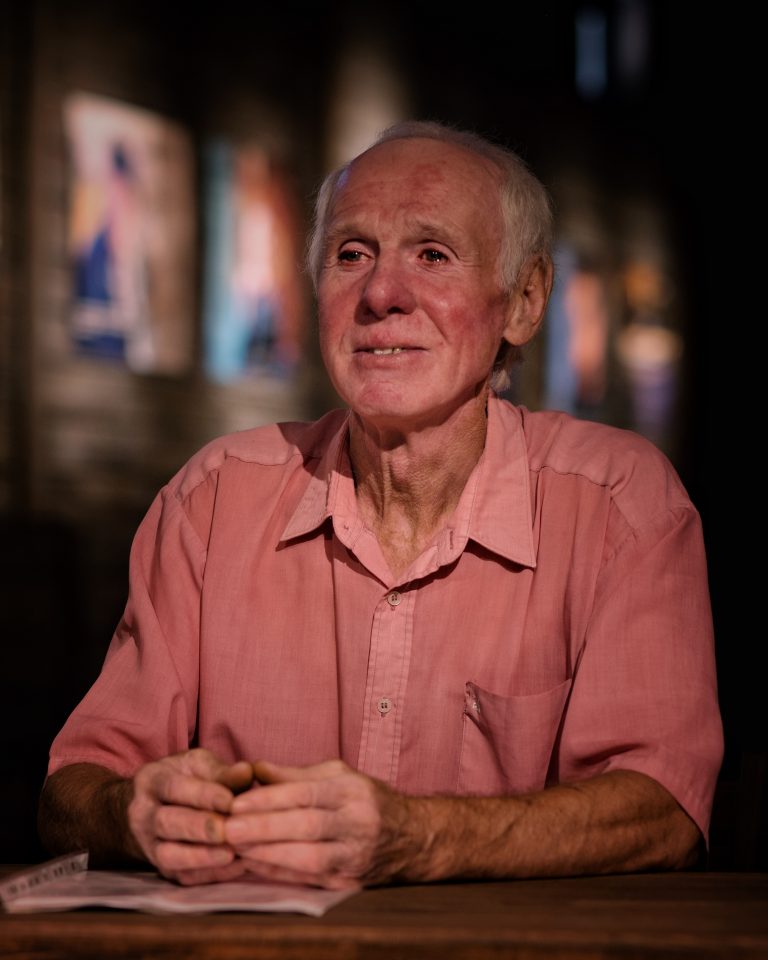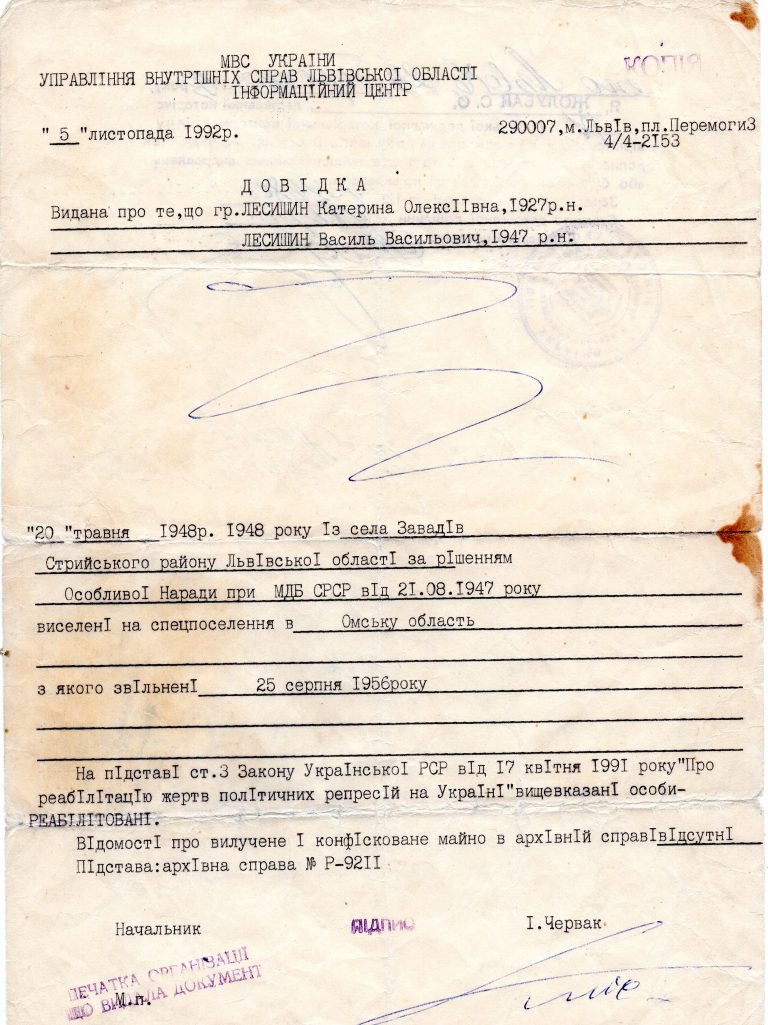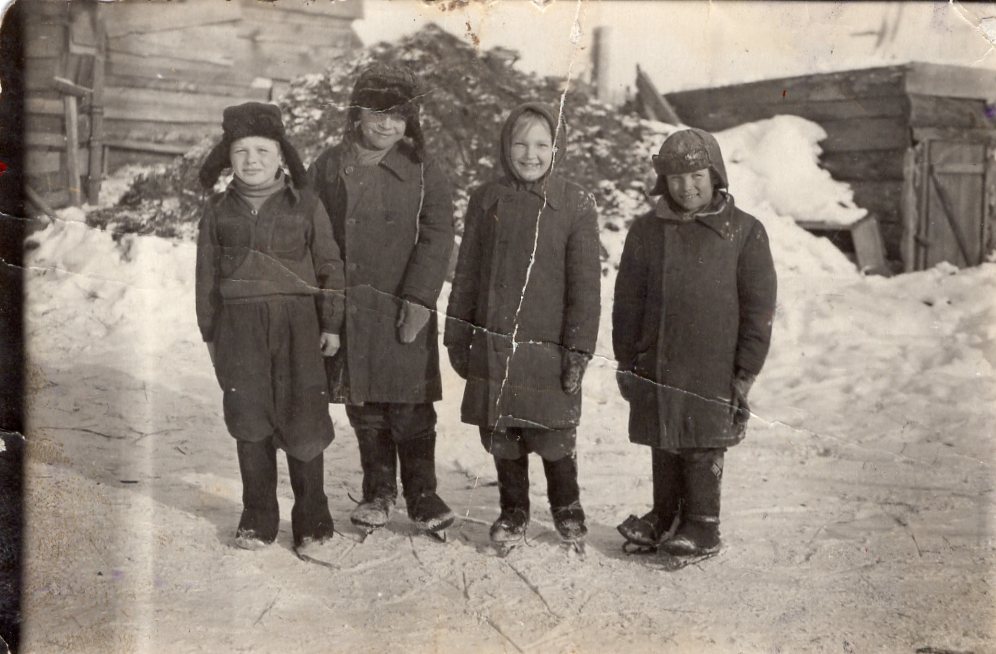Vasyl Lesyshyn
“Everyone was in the same conditions, in the same fetters and under the same supervision of Soviet secret service”
Vasyl Lesyshyn was born on 23 October 1947, in Zavadiv village, Stryi district, to a prosperous patriotic family. On 20 May 1948 he was arrested together with his mother Kateryna Lesyshyn (née Yankovych) and his grandmother, also Kateryna. Later they were transported to Ust-Shysh special settlement in Znamenskyi district, Omsk region, where Vasyl’s father Vasyl Lesyshyn lived after being arrested on 21 October 1947. Grandfather Mykola Lesyshyn was arrested in 1946, served his sentence in Karaganda until 1954, and reunited with his family in Ust-Shysh after his release.
Sentenced at the age of 8 months
Vasyl’s grandfather was arrested as an OUN [Organization of Ukrainian Nationalists] participant. Then a decision was made to deport the entire family to Siberia: father, mother and grandmother. Mother was pregnant and gave birth the following day:
“I was born in a village, but I don’t know in what house. They started deporting people in 1947, taking them from villages. My grandfather was arrested as an OUN member in 1946. Then a decision was made to deport the entire family to Siberia. They were taking people in 1947, on 22 October [the arrest warrant said 21 October] 1947. My mother was pregnant with me at that time. The following day she gave birth to me in some village house. I don’t know which one. On 22 May [certificate of rehabilitation says 20 May] 1948 a decision of the two was made to arrest my mother together with me”.
My younger sister was born in Siberia, where she died as a baby. Another sister Mariya was born in Siberia in 1953. Now she lives in the village, in our grandparents and parents’ house. The fourth sister Slava was born in Zavadiv village, in my parents’ house in 1957.

80-metre-long barracks and timber rafting
In Siberia we lived in long military barracks, each around 80 metres long. Beds stood side by side in the barrack with a passage between them. The entire barrack was swarming with people. Food was cooked in one kitchen in turns.
A toilet was 50-80 metres from the barrack, a dug-out fenced latrine which was used both in summer and during winter frosts, which were sometimes as cold as 35 degrees below zero. The nearest shop was 3-4 km away, selling only brown bread and a limited selection of foodstuffs. Still, we didn’t have much money to buy it with either – people were mostly working for a mark – “20th century slaves”. The distance to the nearest town, Omsk, was about 250 km and there was no transport.
People were on friendly terms. They had nothing to fight about, everyone was in the same conditions, in the same fetters and under the same supervision of the Soviet secret service. They needed to report to the military police on a regular basis. There were many children of different ethnicities and nationalities, but children didn’t feel any difference, “we all were like one family”.
My mother, a young 21–22-year-old girl, was working at timber rafting. She was working there for 8 years and 8 months. My father was working at a smithery. My granddad was in Karaganda at that time. He participated in rebellion and mutiny. There were lots of people from the intellectual class who were actively fighting.
Relaxation came in 1953 when Joseph Stalin died. The corresponding processes were happening in the Soviet state too, so the granddad was released in 1954. Still, he had to come to the Ust-Shysh special settlement. Granddad was grateful, and the father too. After granddad and father returned to Ukraine, they contributed to opening the church in Zavadiv.
Return associated with apples
“In [19]53 when Joseph Stalin died, the corresponding processes were happening in the Soviet state too. In 1954 there was relaxation and granddad was released, but he had to come to Ust-Shysh special settlement where we lived. I remember this episode. My granddad was a big man. He came and took me in his arms and threw me up in the air with joy… I remember this episode”.
The family was released from the special settlement on 25 August 1956. Several weeks later they – mother, father, grandmother, grandfather, Vasyl and his sister – returned to Ukraine. It’s interesting that for many of our respondents life in Ukraine associates with apples. Vasyl also told us how he tasted them for the first time.
“I remember we were leaving Siberia. I remember we were going to Moscow, and from Moscow we travelled by train. We were travelling at night; I woke up and stood up in the wagon. I looked and saw Dnipropetrovsk and, I don’t know, some city in the Eastern Ukraine…there were lights, lots of lights. There was a city. I ate my first apple when I was 9. We didn’t eat apples back there”.


A photo of four nameless friends
For many years Vasyl has been looking for his friends, three children from Latvia who were together with him in the Ust-Shysh special settlement, Znamenskyi district, Omsk region. The narrator applied to the Consulate of Latvia in Lviv, but they couldn’t help him. Unfortunately, he doesn’t remember the names of his friends. He only knows that all of them were born in 1946.
“I remember this story perfectly well. I don’t know why it stuck in my memory. It was like this. It was winter time. Like I said, I went to the toilet, and it was far. I was going back from the toilet, it was winter and I was wearing a hat, and three children were playing near the barrack, each of them 7 or 8 years old. They said: “Vasya, come here, let’s take a picture”. I’m speaking the language they spoke to me. I said: “Ok”. I stood next to them and they took a picture. They gave me a photo. It was 1955, I think. Those children were from the Baltics, from Latvia. They were Latvians. Two boys and one girl. They were skating […] They lived in our barrack, but on the other side. The barrack was some 60-50 metres long.
There were four copies of this photo made and each person photographed received one, so there’s hope that one of them also shared this story and the photo.
Recorded by: Interviewer Liana Blikharska
Where: Lviv
When: 30 July 2021
Recording processed by: Operator Natalia Khasanchyn
Project: “Memory of Ukraine”
Institution: Memorial Museum of totalitarian regimes “Territory of Terror”
Biography prepared by: Olha Mukha
